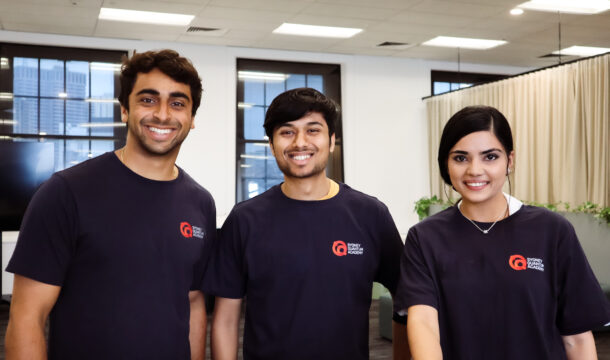PhD Experience Program

Read more of the post PhD Experience Program
Our PhD scholars gained insights into Quantum Motion's cutting-edge work at their Sydney lab.

As part of Sydney Quantum Academy’s PhD Experience program, our scholars were given a rare and exciting opportunity to explore the cutting-edge work being done at Quantum Motion’s lab at Cicada Innovations in Sydney.
The evening featured a talk by Dr. Mark Johnson, Lead Quantum Engineer at Quantum Motion, who shared insights into the current state of silicon-based quantum computing, highlighting key milestones that have been achieved and the challenges that remain. He also provided a broad overview of quantum computing, covering the various physical platforms being explored and the potential applications of this technology.
A key challenge in quantum computing is that qubits, the fundamental units of information in quantum processors, need to be protected from unwanted interactions with their neighbours. In silicon, this means cooling them to almost absolute zero (minus 273 degrees Celsius, or 0 Kelvin). The quantum chips and all the conventional electronics on-chip driving the qubits must be able to operate at these extreme temperatures, requiring specialised cryogenic technology.
Dr Johnson outlined Quantum Motion's efforts to address this challenge by developing custom cryogenic electronics and thermometry to better control and read out large-scale qubit arrays. This advancement has cut measurement times from 24 hours to under 10 minutes, enabling the team to characterize new devices quickly and accelerate their research.
While precise cryogenic control is essential for stable qubit operation, scalability presents another challenge in making quantum computers useful. Dr. Johnson highlighted how silicon could be the most cost-effective and scalable solution for producing the millions of qubits that are needed to create fully-functional, fault tolerant quantum computers.

As Dr. Johnson put it: “If you can take something that is built in silicon, it has the potential to really scale to that degree where it supplants all of the other technologies.”
Dr. Johnson also shared why Quantum Motion chose to expand to Sydney, noting: “It’s the first time that Quantum Motion has expanded internationally, and Australia, especially Sydney, is just a fantastic place for spin qubit research…But one of the key reasons we came here was to develop our talent integration and being able to integrate with the local community.”

After the talk, our PhD scholars were taken on a guided tour of Quantum Motion’s lab, where they had the opportunity to see the technology firsthand. One student summed up the experience by saying, “I feel like I’ve won a golden ticket like in Charlie and the Chocolate Factory.”
The future of quantum computing is closer than ever—and our PhD scholars are right at the forefront of it.

Want to be part of exclusive events like this? Apply for our PhD Scholarship and gain access to the SQA PhD Experience Program.
Be sure to stay informed of Australian quantum news, events and scholarship opportunities by signing up to SQA’s mailing list here.
Explore our PhD scholars' journeys, learn about the scholarship program, and find out how to apply.

Read more of the post PhD Experience Program

Read more of the post PhD Programs

Read more of the post How to apply for a quantum PhD in Sydney

Read more of the post Our PhD Scholars